- Home
- Matthew Pearl
The Poe Shadow Page 2
The Poe Shadow Read online
Page 2
That cold-blooded formality. That had been Baltimore’s farewell to our nation’s literary savior, my favorite author, my (perhaps) friend? I could barely contain the sense of anger growing within me; anger of a sort that blocked out everything else. I know, looking back on this, that I never wanted to hurt Hattie through the commotion that crept over my mind beginning that afternoon. Yes, this was my favorite author, who had died in my midst, but even then it was far more than that. Perhaps I cannot in one breath fairly describe why it was so devastating to a man with youth, with romantic and professional prospects enviable to anyone in Baltimore.
Perhaps it was this fact. I—without having appreciated the fact—I had been the one to see him last; or, rather, as all others rushed past, I had been the last to watch the indifferent earth rattling over his coffin, as over the nameless corpses of the world.
I had a dead man for a client and the Day of Judgment as my hearing date.
That was the sardonic way Peter put it a few weeks later when I began my fateful inquiries. My law partner did not have enough of the wit about him to be sardonic more than three or four times in his life, so you can imagine the agitation behind the words. Peter, a man of height and bulk, was my elder by only a few years, but he sighed with the sigh of an old man, especially at the mention of Edgar A. Poe.
By my teen years, two facts in my life were as fixed as destiny: my admiration for literary works by Edgar Poe and, as you have heard, my attachment to Hattie Blum.
Even as a boy, Peter talked about Hattie and me being married with the focus of a man of business. In his prudent heart, the boy was older than all other boys. When his father had died, my parents, through my father’s church, had assisted the widowed Mrs. Stuart, who had been left nearly destitute by debt, and my father treated Peter like another son. Peter was so thankful for this that he dutifully and genuinely adopted all of my father’s positions on affairs of the world, far more than I could ever seem to do. Indeed, it might have seemed to a stranger that he was the rightful Clark, and I a second-rate pretender to the name.
Peter even shared my father’s distaste toward my literary preferences. This Edgar Poe, he and my father were both prone to say, this Poe that you read with such compulsion is peculiar beyond taste. Reading for the relief of ennui was simply pleasuremongering, no more useful to the world than dozing in the middle of an afternoon. Literature should improve the heart; these fantasies cripple it!
That is how most people saw Poe, and I would not have disagreed at first. I was hardly out of boyhood the first time I came upon Poe’s work, a Gentleman’s Magazine tale called “William Wilson.” I confess I could not make much of it. I could find neither beginning nor end and could not distinguish the portions that exhibited reason from those of madness. It was like holding a page up to a mirror and trying to read it. Genius was not looked for in the magazines, and I saw no greater amount of it residing in Mr. Poe.
But I was only a boy. My judgment was transformed by a story of a class peculiar to Poe, a story of criminal detection entitled “The Murders in the Rue Morgue.” This story’s hero is C. Auguste Dupin, a young Frenchman who ingeniously unravels the truth behind the shocking slayings of two women. One woman’s body is found in a house in Paris, thrust up the chimney feetfirst. Her mother, meanwhile, has been sliced at the neck so severely that when the police try to raise her body, her head falls off. There were valuables in plain view in their chambers, yet whatever deranged intruder had been inside had left them unmolested. The singularity of the crime was entirely baffling to the Paris police and the press and the witnesses—well, to everyone. Everyone except C. Auguste Dupin.
Dupin understood.
He understood that it was the strikingly singular nature of the deaths that made them at once easily solvable, for it separated the event instantly from the indistinguishable muddle of everyday crimes. It seemed to the police and the press that the murders could not have been done by even an irrational person, because they had been done by no person. Dupin’s reasoning followed a method Poe called ratiocination—employing one’s imagination to achieve analysis, and one’s analysis to climb the heights of imagination. Through this method, Dupin showed how a rare orangutan, provoked to a rage by abuse, had committed the horrible atrocities.
From the hand of an ordinary person, the particulars would have seemed stuff and nonsense. But at the very moment the reader expresses disbelief at the course of events, every difficulty is eliminated by an unbreakable chain of reasoning. Poe whetted the curiosity for what is possible to its sharpest edge, and that brought the soul along with it. These tales of ratiocination (with sequels touching Dupin’s further cases) became Poe’s most popular among a mass of readers, but, in my opinion, for the wrong reasons. Mere spectator readers enjoyed seeing an unbroken puzzle solved, but there was a higher level of importance. My ultimate object is only the truth, said Dupin to his assistant. I understood, through Dupin, that truth was Edgar A. Poe’s only object, too, and that precisely is what frightened and confused so many about Poe. The genuine mystery was not the particular riddle that the mind aches to know; the mind of man, this was the tale’s true and lasting mystery.
And I found something new to me as a reader: recognition. I felt suddenly less alone in the world with his words before me. Perhaps this is why the occasion of Poe’s death, which might have riveted another reader for a passing day or two, inhabited my thoughts.
My father liked to say that truth resided in honest professional gentlemen of the world, not in the monstrous tales and hoaxing stories of some magazine writer. He had no use for Genius. He said that most men in the armies of the world were required to attend to homely duties of life, where Industry and Enterprise were more in need than Genius, which was too squeamish at men’s dullness to succeed in the world. His business was packinghouses, but he took to the notion that a young man should be an attorney, a complete business in itself, he said admiringly. Peter positively thrilled at the plan as though he were boarding the first ship to California on whispers of gold.
Upon achieving maturity, Peter situated himself as an apprentice to a law office of some distinction and while there achieved notice for compiling a thorough work, An Index to the Laws of Maryland, from the Year 1834 to 1843. My father soon financed Peter’s own practice, and it was clear that I was to study and work under my friend. It was a plan too reasonable to object to, and I never once thought to do so—not once that I can remember, at least.
You are fortunate, Peter wrote to me when I was still at my university. You shall have a fine office here with me under your Father’s auspices and you shall marry as soon as you wish. Every beautiful young woman of high standing on Baltimore Street smiles on you, by the bye. If I were you, if I had a face half as handsome as yours, Quentin Clark, how well I would know what to do with ease and luxury in society!
By the fall of 1849, where you joined me some pages earlier, I had my profession in place so securely I hardly took notice of it. Peter Stuart and I made excellent partners. My parents were both gone by then, killed by a carriage accident while they were traveling in Brazil for my father’s business. There was an empty spot where there once had been guidance from my father. And yet, the life he’d arranged for me flowed on in his absence—all this, Hattie, Peter, the well-pressed clients appearing daily in our offices, my stately family house shaded by ancient poplars and known as Glen Eliza, after my mother. All this ran on as though operated by some noiseless and ingenious automatic machine. Until Poe’s death.
I had the young man’s weakness of wishing others to understand everything that concerned me—of needing to make others understand. I believed I could. I can call to mind the very first time I told Peter we should work to protect Edgar A. Poe. Believing that, as a result of the compliance I imagined on the part of Peter, I would be able to report back the good tidings to Mr. Poe.
My very first letter to Edgar Poe, on March 16, 1845, was brought about by a question I had when reading “The Rave
n,” then a recently published poem. The final verses leave the raven sitting atop a bust of Pallas “above my chamber door.” With these last lines of the poem, the impish and mysterious bird continues to haunt the young man of the poem, perhaps for eternity:
And his eyes have all the seeming of a demon’s that is dreaming,
And the lamp-light o’er him streaming throws his shadow on the floor;
And my soul from out that shadow that lies floating on the floor
Shall be lifted—nevermore!
If the raven sits at the top of the chamber door, though, what lamplight would be behind him in such a way as to cast his shadow to the floor? With the impetuousness of youth, I wrote to Poe himself for an answer, for I wanted to be able to envision every crevice and corner of the poem. Along with the question, I enclosed in the same letter to Mr. Poe a subscription fee for a new magazine called The Broadway Journal, which Poe was then editing, to make sure I’d see whatever else flowed from his pen.
After months without receiving any reply, and without a single number of The Broadway Journal, I wrote again to Mr. Poe. When the silence persisted, I addressed a complaint to an associate of the magazine in New York and insisted that my subscription be refunded in full. I no longer desired to ever see it. One day, I received my three dollars back, along with a letter.
Signed Edgar A. Poe.
How startling, how uplifting that was, such a lofty visionary bringing himself to personally address a mere reader of three and twenty years! He even explained the minor mystery regarding the raven’s shadow: “My conception was that of the bracket candelabrum affixed against the wall, high up above the door and bust—as is often seen in the English palaces, and even in some of the better houses in New-York.”
There was the very nature of the raven’s shadow explained just for me! Poe also thanked me for my literary opinions and encouraged me to send more. He explained that his financial partners in The Broadway Journal had forced its termination in yet another defeat in the struggle between money and literature. He had never regarded the journal as more than a temporary adjunct to other designs. One day, he said, we might meet in person and he would confide in me his plans, and inquire my advice. “I am entirely ignorant,” he stated, “of all law matters.”
I wrote nine letters to Poe between 1845 and his death in October 1849. I received in return four courteous and sincere notes in his own hand.
His most energetic comments were about his ambitions for his proposed journal, The Stylus. Poe had spent years editing other people’s magazines. Poe said the journal would finally allow men of genius to triumph over men of talent, men who could feel rather than men who could think. It would cheer no author who did not deserve it, and would publish all literature that was unified by clarity and, most importantly, truth. He had waited many years to begin this journal. He wrote to me the last summer before his death that if waiting until the Day of Judgment would increase his chances of success, so he would! But, he added, he instead hoped to have the first number of it out the next January.
Poe anticipated with excitement a trip to Richmond to gather finances and support, commenting that if everything went as he intended, his final success was certain. He needed to raise funds and subscriptions. But he continued to be hindered by the rumors in the so-called professional press of irregular and immoral habits, questions about his sanity, unfit romantic dalliances, general excessiveness. Enemies, he said, were always at his throat for publishing honest criticisms of their writings, and for having had the great nerve to point out the complete lack of originality in revered authors like Longfellow and Lowell. He feared that the animosities of small men would attack his efforts by painting him as a sot, an unworthy drunk not deserving any public influence.
That is when I asked. I asked plainly, maybe too plainly. Were these at all true, these accusations I had heard for years? Was he, Edgar A. Poe, a drunkard who had given himself over to excess?
He wrote back without the least air of offense or conscious superiority. He vowed to me—me, a practical and presumptuous stranger—that he was wholly abstemious. Some readers might question my ability to judge his truthfulness from afar, but my instincts spoke with unclouded certainty. In my next letter, I replied that I put full confidence in his word. Then, just before sealing my reply, I decided to do better.
I made a proposal. I would bring suit against any false accuser attempting to damage his efforts to launch The Stylus. We had represented the interests of some local periodicals before, providing me with the proper experience. I would do my part to ensure that genius would not be trampled. This would be my duty, just as it was his duty to astonish the world now and then.
“Thank you for your promise about The Stylus,” answered Poe in a letter replying to mine. “Can you or will you help me? I have room to say no more. I depend upon you implicitly.”
That was shortly before Poe began his lecture tour in Richmond. Emboldened by his response to my offer, I wrote again, pouring out a myriad of questions about his Stylus and where he planned to raise money. I expected he would respond while he was touring, which is why I visited the post office and, when business consumed my time, checked the lists of waiting mail the postmaster regularly inserted in the newspapers.
I had been reading Poe’s work more than ever. Particularly after my parents died. Some considered it distasteful that I would read literature that frequently touched on the topic of death. Yet in Poe, while death is not a pleasant subject, it is not forbidden. Nor is it a fixed end. Death is an experience that can be shaped by the living. Theology tells us that spirits live on beyond the body, but Poe believes it.
Peter, of course, had at the time vocally dismissed the idea of our law practice taking up the cause of The Stylus.
“I would sooner cut off my hand than spend my time worrying about magazines of blasted fiction! I would sooner get run down by an omnibus than—” You can see what he was driving at.
You’d probably guess that the real reason Peter objected was because I could not answer his questions about the fees. Poe was regularly reported in the papers as penniless. Why take upon ourselves, Peter argued, what others wouldn’t? I pointed out that the source for our payments was obvious: the new journal. Success was guaranteed for it!
What I wanted to say to Peter was “Do you not ever feel you are becoming hackneyed by the lawyer’s routine? Forget the fees. Wouldn’t you wish to protect something you knew to be great that everyone else sought to desecrate? Wouldn’t you wish to be a part of changing something, even if it meant changing yourself?” That line of argument would have accomplished nothing with Peter. When Poe died Peter was quietly satisfied that the matter had ended.
But I was not, not in the least. As I read newspaper articles eulogizing Poe with bitter voices, my desire to protect his name only grew. Something had to be done even more than before. When he was alive, he could defend himself. What enraged me most deeply was that these carping muckworms not only embellished the negative facts about Poe’s life, but that they crowded around the scene of Poe’s death like little hungry flies. Here was the ultimate evidence, the crowning symbol—ran their logic—of a lifetime of moral frailty. Poe’s dismal and low end served to confirm the darkness of his life and the imperfections of his morbidly inclined literary productions. Think of Poe’s miserable end, groaned one paper.
Think of his miserable end!
Think not of his unprecedented genius? Not of his literary mastery? Not of how he sparked life in his readers at times when they felt none? Think of kicking a lifeless body into the gutter, and striking the cold forehead of a corpse!
Go visit that grave in Baltimore (the same paper advised) and receive from the very air around it the awful warning of this man’s life to ours.
I announced one day that something must be done. Peter laughed.
“You cannot bring suit—the man is under the sod now!” said Peter. “You shall have no client! Let him rest; let us rest.” Peter started wh
istling a popular tune. Whenever he was unhappy, he whistled, even if it was in the middle of a conversation.
“I tire of being hired for a little money to say or do other than what I believe, Peter. I made a commitment to represent his interests. A promise, dear friend, and do not tell me that promises should end at someone’s death.”
“He likely agreed to your help only to keep you from badgering him on the matter.” Peter saw that this statement bothered me and he pressed the point with a more sympathetic but insightful tone. “Is that just possible, my friend?”
I thought about something Poe had said in one of his letters regarding The Stylus: This is the grand purpose of my life, wrote Poe. Unless I die, I will accomplish it. Poe insisted in the same letter that I stop paying advance postage in our correspondence. He signed the letter “Your Friend.”
And so I had written the same words to him—the same two simple words in plain ink, and signed my name below them as I would a dead-serious oath. Who would ever have argued then that I should not keep it?
“No,” I answered Peter’s question. “He knew I could defend him.”
2
THE THREAT CAME on a Monday afternoon. There were no guns, no daggers, no swords, no near hangings involved (nor would I have believed these were coming for me). The utter astonishment on this day proved more forceful.
My visits to the Baltimore athenaeum reading rooms were becoming regular. A certain prominent debtor’s lawsuit, commenced around that time, obliged us to gather diverse news clippings. In times of pressing business, Peter would have been happy to construct a bunk in our chambers and never meet with a ray of sunlight, so it fell to me to travel the short distance to the reading room to perform the researches. While I was there, I would also research Edgar Poe and his death.

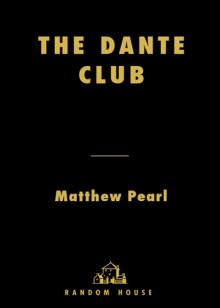 The Dante Club
The Dante Club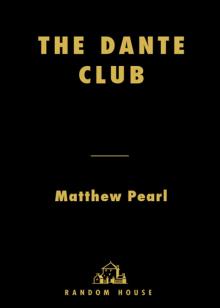 Dante Club
Dante Club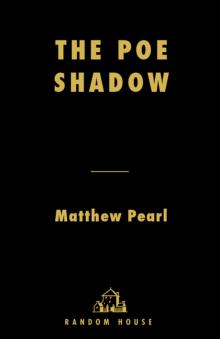 The Poe Shadow
The Poe Shadow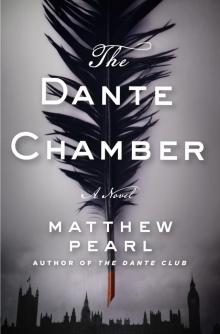 The Dante Chamber
The Dante Chamber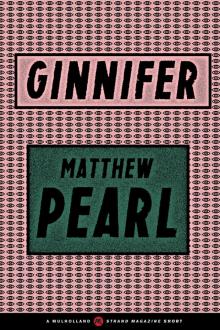 Ginnifer
Ginnifer Company Eight
Company Eight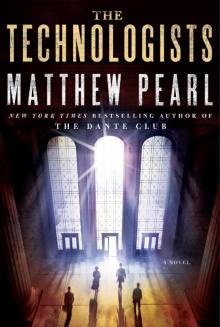 The Technologists
The Technologists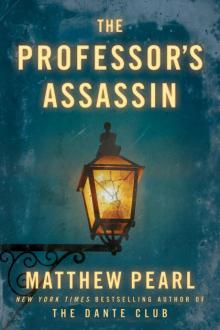 The Professor's Assassin
The Professor's Assassin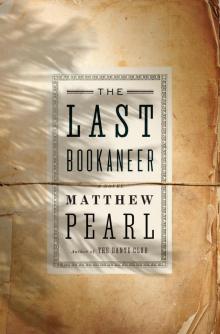 The Last Bookaneer
The Last Bookaneer Company Eight (Kindle Single)
Company Eight (Kindle Single)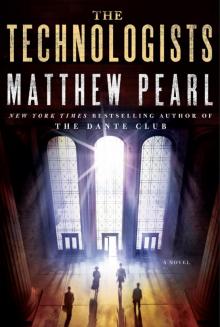 The Technologists: A Novel
The Technologists: A Novel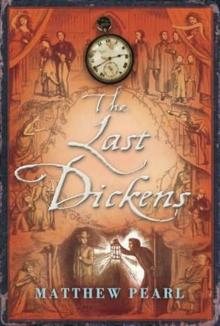 The Last Dickens
The Last Dickens